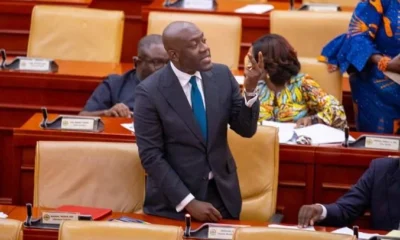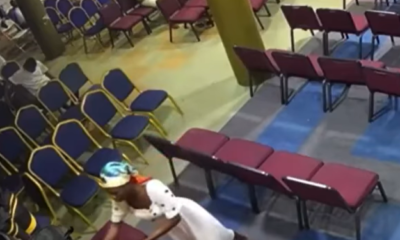International
Gaza’ to prevent hunger crisis, ending 10-week blockade
Published
9 months agoon
By
Desert Man
Israel has announced it will allow a “basic amount of food” to enter Gaza “to ensure a famine crisis does not develop” after blockading the territory for 10 weeks.
A statement from the Prime Minister’s Office said: “On the recommendation of the IDF, and out of the operational need to enable the expansion of the intense fighting to defeat Hamas, Israel will introduce a basic amount of food to the population in order to ensure that a famine crisis does not develop”.
The announcement came hours after after Israel’s military said it had begun “extensive ground operations” throughout Gaza.
An evacuation order was issued on Sunday evening for several areas it warned would face imminent attacks.
The Israeli Defense Forces (IDF) launched strikes on sites including a hospital in northern Gaza on Sunday as part of a new offensive called Operation Gideon’s Chariot.
Israel says it aims to free hostages held in Gaza and defeat Hamas.
Strikes hit the southern city of Khan Younis, as well as towns in the north of Gaza, including Beit Lahia and the Jabalia refugee camp, rescuers said.
At least 67 people have been killed and 361 injured in Gaza in the last 24 hours, the Hamas-run health ministry said.
A woman in Khan Younis told the BBC the situation there was “very difficult” and she had been kept awake by the sound of bombing, while enduring “severe shortages of flour and gas and food”.
The civil defense, Gaza’s main emergency service, said the al-Mawasi camp in the south, where displaced people had been sheltering, was also attacked overnight leading to 22 deaths and 100 people injured. The camp had previously been designated as a “safe zone”.
In the broad evacuation order on Sunday that it described as a “final warning”, the Israeli army said it would “launch a powerful strike on any area used for launching rockets”, and urged people to “move immediately west to the known shelters in al-Mawasi”.
Three public hospitals are now “out of action” in the North Gaza governorate, the health ministry said, amid Israel’s escalating air strikes.
Medical staff at one of them, the Indonesian Hospital in Beit Lahia, told the BBC at about 21:40 local time (20:40 GMT) that IDF tanks had pulled up outside and were firing at the hospital. They said 55 people were inside, including four doctors and eight nurses. The rest were immobilized patients who were not able to flee the hospital after the morning’s attack, they said.
About 50 minutes later staff said the IDF had left the vicinity of the hospital.
The IDF has said its troops are fighting “terrorist infrastructure sites” in northern Gaza, including the area adjacent to the Indonesian Hospital.
Earlier on Sunday, Gaza’s health ministry said staff and patients there had come under “heavy fire”. It accused Israel of besieging the hospital, cutting off access, and “effectively forcing the hospital out of service”.
Medics told the BBC no evacuation order or warning was issued before the attacks, and at no point were there any military targets in the Indonesian Hospital.
The onslaught comes as negotiators from Israel and Hamas continue trying to reach a ceasefire agreement in Qatar.
Israeli media quoted the office of Prime Minister Benjamin Netanyahu as saying Israel’s negotiating team was exhausting “every possibility” for a deal on Sunday.
Netanyahu’s statement said it “would include the release of all the hostages, the exile of Hamas terrorists, and the disarmament of the Gaza Strip”, reports said.
A senior Hamas source told the BBC that “no breakthrough or progress has been achieved so far in the ongoing negotiations in Doha due to continued Israeli intransigence”.
The source said Hamas had expressed willingness to release all Israeli hostages in a single phase, “on the condition of reaching a comprehensive and permanent ceasefire agreement – something the Israeli side continues to reject, as their negotiating team lacks the mandate to decide on key issues”.
The source stressed that Hamas “rejects any partial or temporary arrangements”. The group has proposed releasing all hostages in exchange for an agreed number of Palestinian prisoners, a full Israeli withdrawal from the Gaza Strip, and the entry of humanitarian aid – which Israel has now been blockading for 10 weeks.
“Israel wants to retrieve its hostages in one or two batches in return for a temporary truce,” the Hamas source told the BBC.
- Hamas proposes releasing some hostages in fresh talks after new Israel offensive
- US ‘troubled’ by humanitarian situation in Gaza, Rubio tells BBC
- Ros Atkins on… how world leaders are responding to Israel’s blockade of Gaza
Speaking to the BBC on Sunday, Mohammed Salha, director of the al-Awda private hospital in northern Gaza, said the closure of the Indonesian Hospital would affect the care he was able to provide.
He said al-Awda depended on the Indonesian Hospital for stores of oxygen and for its intensive care unit.
Mr. Salha added that there had been a bombing near his hospital overnight causing “a lot of damage” to the facility that staff were attempting to quickly repair.
You may like
-


Asiedu Nketia Uses NDC Thank You Tour to Collect Feedback on Government
-


Speaker Urges Executive to Grant Parliament Permanent Land
-


Finance Expert Warns Cocoa Reforms Could Worsen COCOBOD Debt
-


Jinapor Swears In New VRA Resettlement Trust Fund Board
-


Minority Demands Dismissal of COCOBOD CEO Over Cocoa Price Crisis
-


OSP Questions Baba Jamal Over Alleged Vote-Buying in Ayawaso East Primary
-


Police Arrest Woman Over Fire Incident at Alpha Hour Founder’s Church
-


NRSA: Commercial Tricycles Still Illegal Under Ghana’s Road Traffic Laws
-


NADMO Launches Rainy Season Safety Campaign in Fanteakwa South Markets

















